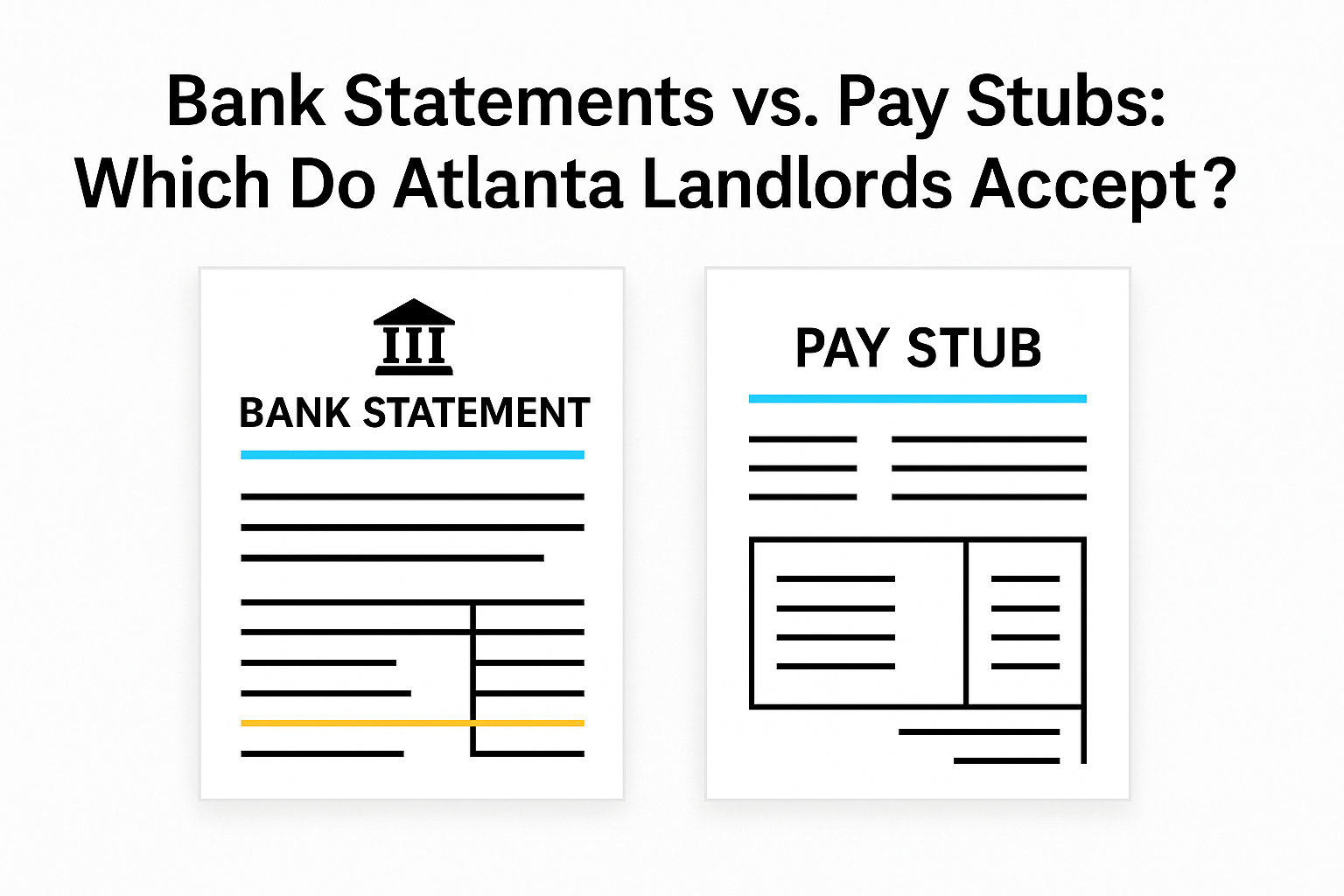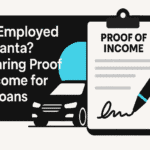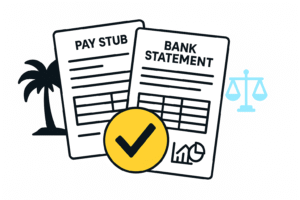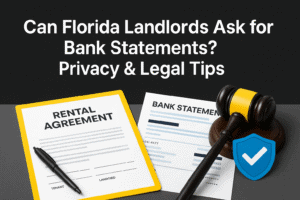Last updated: September 2025
Renting an apartment or applying for a loan means demonstrating that you can meet your obligations. Yet many applicants are unsure whether bank statements or pay stubs carry more weight, especially in fast‑moving markets like Atlanta. To remove the guesswork, this guide clarifies when to rely on bank statements vs pay stubs for rent and how to package both for a smooth review. :contentReference[oaicite:0]{index=0}
This article unpacks the differences, explains regional rules across the United States, United Kingdom and Canada, and shows how FinancialDocsProvider.com can format your documents for maximum clarity. We operate on a strict compliance‑first basis: we edit for readability and organization, but we never change numbers, dates or payees.
The goal of this guide is two‑fold: to help you understand what landlords, lenders and underwriters are really looking for, and to show how simple formatting improvements can accelerate approvals. Throughout the article you will find tips, checklists and local insights tailored for Atlanta residents. We support clients across the US, UK and Canada, so our discussion spans multiple legal frameworks.
Related Entities & Terms
- Documents & forms: pay stub, payslip, paycheque, wage statement, W‑2 (US), 1099‑NEC/1099‑K (US), P60/P45/SA302 (UK), T4/T4A and Notice of Assessment (Canada), bank statements, proof of income letter
- Regulators: Consumer Financial Protection Bureau (CFPB), Federal Trade Commission (FTC), Internal Revenue Service (IRS), Financial Conduct Authority (FCA), HM Revenue & Customs (HMRC), Financial Consumer Agency of Canada (FCAC), Canada Revenue Agency (CRA)
- Housing agencies & programs: Georgia Department of Community Affairs (DCA), UK “Right to Rent”, Housing Benefit, Canada Mortgage and Housing Corporation (CMHC)
- Concepts: gross vs. net pay, year‑to‑date earnings, self‑employed income, gig worker earnings, tenant background checks, guarantor/co‑signer
As you read, remember that financial documents should tell the same story across all sources. Landlords often compare pay stubs to bank statements, tax returns and employment verification. Aligning these documents—without altering facts—helps you sail through screening.
What are the legal basics of proving income?
Summary: Income verification rules differ across jurisdictions, but honesty and accuracy are universal. There is no single law that forces Atlanta landlords to accept one document over another; instead, they look for consistency across pay stubs, bank statements, tax returns and employment letters. This section explains why these documents matter, how rules vary in the US, UK and Canada, and what constitutes acceptable proof.
United States: At the federal level, employers must keep accurate payroll records but are not obliged to issue printed pay stubs. Landlords, however, typically request recent pay stubs because they show gross pay, deductions, taxes and net income. Bank statements can corroborate that income by showing deposits. The Consumer Financial Protection Bureau (CFPB) notes that to evidence consistent payments on notes receivable, consumers may provide deposit slips, cancelled checks, bank account statements or tax returns. The same logic applies to rental screening: bank statements confirm that payments actually reach your account. Local authorities and housing programs in places such as Santa Cruz County explicitly list pay stubs, bank statements, benefits letters and tax returns as required documents for income verification.
State & city specifics: In Georgia, there is no statute mandating W‑2 pay stubs or specifying that landlords must accept bank statements. Most Atlanta property managers use tenant screening services governed by the Fair Credit Reporting Act (FCRA) to verify employment, income and credit. Applicants commonly provide two to three of the following: recent pay stubs, bank statements covering the past two to three months, tax returns, a job offer letter or a guarantor’s documentation. Subsidized housing programs have additional rules; for example, applicants to the Housing Choice Voucher program must meet published income limits and supply complete, accurate information. Fabricating documents can lead to denial, eviction or federal fraud charges.
United Kingdom: UK landlords and letting agents must perform “Right to Rent” checks to confirm immigration status, but they also assess affordability. Guidance from the housing charity Shelter explains that agents often ask for an employment contract or letter, payslips or bank statements, and proof of benefit entitlements. There is no law requiring a specific number of payslips, but three months’ worth is typical. Tenants can also show savings or a guarantor to meet affordability criteria. Importantly, altering the figures on a payslip or bank statement constitutes fraud under the Fraud Act 2006.
Canada: Canadian landlords may request proof of income such as pay stubs, T4 slips, Notices of Assessment (NOA) or proof of income statements from the Canada Revenue Agency (CRA). The CRA notes that a proof of income statement summarizes a taxpayer’s income and deductions and can be used when applying for a loan or benefit. While not required by law, many landlords prefer a combination of recent pay stubs and an NOA to validate annual earnings. Some provinces also regulate how much information a landlord may collect; for example, British Columbia’s Residential Tenancy Act restricts unreasonable requests for personal information.
Across all jurisdictions, the underlying principle is clear: documents must be truthful and verifiable. Landlords use them to assess whether your income meets a multiple of the rent (often 2.5–3×). If your pay varies, your bank statements should show deposits that align with the gross and net pay on your stubs. Self‑employed applicants may instead provide profit‑and‑loss statements, invoices and bank deposit histories. When in doubt, provide more documentation rather than less, and keep everything consistent.
Quick comparison—what counts as proof?
- Commonly accepted: pay stubs/payslips; bank statements with payroll deposits; W‑2s, T4s, P60s; Notices of Assessment; employment offer or verification letters.
- Context‑dependent: benefit award letters; pension statements; scholarship or stipend letters; court orders for child support or alimony plus deposit evidence.
- Not acceptable: altered or backdated documents; screenshots that crop key details; unverifiable third‑party “templates” made to mimic official forms.
If you are evaluating bank statements vs pay stubs for rent in Atlanta, treat them as complementary. Pay stubs establish earnings; bank statements prove cash flow and stability over time.
Which edits are allowed?
Summary: Editing your financial documents for clarity and privacy is lawful when it does not alter factual information. You may redact sensitive data, reorganize pages, convert file formats and add explanatory notes. These adjustments help landlords and lenders review your package quickly without compromising accuracy.
Here are common edits that are generally permissible:
- Redact personal identifiers. Remove your Social Security number, National Insurance number, account number or other sensitive details. For example, you can black out all but the last four digits of an account number on a bank statement to protect against identity theft.
- Improve legibility. Straighten skewed scans, adjust brightness or contrast and convert image files into a standard PDF size. Clear pages enable underwriters to verify information quickly.
- Reformat for coherence. Combine multiple pay stubs or bank statements into a single, orderly PDF and add bookmarks or a cover sheet. This helps screening services cross‑reference deposits with gross and net pay.
- Annotate. Use callouts or side notes to highlight key figures such as gross pay, year‑to‑date income or average monthly deposits. If your pay cycles vary, include a summary table explaining the range.
- Translate or transcribe. Replace cryptic payroll codes with plain‑language labels so that reviewers can understand each field. This is especially helpful for international tenants presenting documents in a different language or format.
- Apply OCR and accessibility. Run optical character recognition to make PDFs searchable and add tab order or alt text where appropriate. Searchable documents speed up underwriting.
- Document provenance. Add a brief cover note indicating where each document came from (e.g., “Downloaded from XYZ Bank portal on Aug 31”). Source transparency builds trust.
All of these edits share one rule: do not change the underlying numbers, dates or parties. FinancialDocsProvider.com specializes in these lawful adjustments. We take your original digital pay stubs and bank statements, ensure they are complete, clean up formatting and compile a professional package. We never fabricate deposits or rewrite your income; we simply make what’s already there easier to verify.

Which edits are illegal?
Summary: Changing factual information on your pay stubs or bank statements is fraud. Inflating income, fabricating deposits, backdating documents or using another person’s statements can result in application denial, eviction and even criminal charges. This section outlines what crosses the line and why the risk is never worth it.
Landlords and lenders are trained to spot inconsistencies. Screening companies match the gross and net pay on your stubs to the deposits on your bank statements and may verify your employment directly. Altering any of the following elements is illegal and, in many jurisdictions, prosecutable:
- Changing numbers. Inflating gross or net pay, modifying tax deductions or adding fictitious balances.
- Backdating documents. Re‑dating a pay stub, tax return or bank statement to meet a timeframe. Dates should reflect when the income was earned or deposited.
- Inserting fake transactions. Adding phantom deposits or altering transaction descriptions to mimic employment income.
- Misrepresenting identity. Submitting someone else’s documents or changing employer names, addresses or EINs. Using another person’s pay stubs can constitute identity theft.
- Removing negative information. Deleting overdraft notices, loan repayments or returned deposits can mislead reviewers about your financial health.
The consequences of falsifying financial documents can be severe. Housing authorities such as the NYC Housing Authority require applicants to submit employment pay stubs and bank books or bank statements when verifying income and assets. Providing altered documents can lead to the loss of housing assistance, fines or prosecution under fraud statutes. Similarly, local governments like the Santa Cruz County Housing Authority warn that pay stubs and bank statements must be original and accurate; for self‑employed or cash‑paid applicants, bank statements must document actual deposits. Landlords often share information with one another, so a single fraudulent application can jeopardize future rentals.
In short, if the information on your statement or stub doesn’t match the truth, do not submit it. Instead, gather additional supporting documents—tax returns, employment letters, profit‑and‑loss statements or a guarantor’s guarantee—and provide a clear explanation. Honest documentation is the only path to long‑term success.
How reviewers detect tampering: Underwriting teams often check PDF metadata, font consistency, transaction cadence and routing/account number formats. They may also request independent employment verification. These checks quickly expose edits that go beyond privacy or formatting.
When do you need professional document formatting?
Summary: Many applicants find that standard payroll or banking downloads aren’t enough. Scans may be crooked, multi‑page documents may be separated into different files, and self‑employed income can be confusing. If you are weighing bank statements vs pay stubs for rent, professional formatting helps you present both sources clearly and reduce processing time.
Professional formatting is particularly useful in the following scenarios:
How do Atlanta landlords view bank statements vs. pay stubs?
In Atlanta, landlords typically want to see both recent pay stubs and bank statements to confirm that your income covers rent and that deposits are actually made. Pay stubs provide evidence of your gross earnings, deductions, taxes and net pay. Bank statements show the money landing in your account and help confirm the stability of your income over time. For salaried employees, landlords usually ask for two to three of the most recent pay stubs along with the last two to three months of bank statements. This combination allows them to verify that your take‑home pay matches your deposits and that there are no unexplained overdrafts.
For example, if you earn $4,000 per month but your bank statement shows irregular deposits of $2,000 and $6,000, the landlord may ask questions about bonuses, tips or additional jobs. A cover letter or annotation can clarify this. In the UK and Canada, landlords and letting agents apply similar logic—reviewers may request payslips, bank statements and Notices of Assessment to build a full picture of your finances.
Mini‑scenario (Atlanta, salaried): You receive semi‑monthly pay of $2,500 net. Your bank shows deposits on the 15th and 30th that match your stubs, with no overdrafts. Package three recent stubs and three months of statements, add a one‑page income summary, and include your offer letter if you started within the last 90 days.
Mini‑scenario (Atlanta, new job): You signed an offer but only have one stub. Provide the signed offer letter, your first pay stub, and 60–90 days of bank statements showing savings to cover move‑in costs and the first two months’ rent.
What about gig workers and self‑employed applicants?
If you work as a contractor, freelancer or ride‑share driver, you may not receive traditional pay stubs. Instead, you might have 1099 forms (US), SA302 self‑assessment forms (UK), or T4A slips (Canada) and irregular bank deposits. Landlords and lenders often struggle to interpret these documents. Professional formatting can help by:
- Organizing monthly income summaries, including gross receipts, business expenses and net income.
- Matching invoices to bank deposits and highlighting patterns (e.g., weekly transfers from a gig platform).
- Providing an annual comparison using tax returns and Notices of Assessment to verify that your income is consistent year over year.
- Adding an accountant’s letter or attestation, when available, to explain seasonality and document controls.
Mini‑scenario (rideshare): Weekly deposits vary between $350 and $700. Prepare six months of statements, a monthly earnings summary, and your last two tax returns. Add notes explaining surge periods and downtime so averages are easy to assess.
Mini‑scenario (consultant): You bill large but infrequent invoices. Include contracts, invoice copies, and a reconciliation that ties each invoice to a matching bank deposit. This prevents questions about large, irregular credits.
Auto loans, mortgages and other credit applications
Lenders for car loans or mortgages use many of the same documents as landlords, but they typically require more depth. Bank statements show cash flow, savings and spending habits; pay stubs verify current employment; and tax returns reveal annual income. For mortgages, underwriters may request W‑2s or T4s from the last two years, a Notice of Assessment or tax transcript, and up to three months of bank statements. Some loan officers may also ask for a letter from your employer confirming your salary and position. Supplying these documents in a clean, combined package speeds up the underwriting process.
If you are self‑employed and applying for a Small Business Administration (SBA) loan in the US, you will need to present profit‑and‑loss statements, balance sheets, bank statements and personal tax returns. Professional document packaging ensures these documents are easy to navigate and consistent with one another.
Special circumstances
Some applicants may not have traditional income because they rely on benefits, pensions or stipends. In such cases, a combination of benefit award letters, bank statements and budget summaries can prove affordability. International students or newcomers may use foreign payslips, scholarship letters or letters of support from sponsors. In Canada, for instance, the CRA’s proof of income statement is a handy summary for newcomers who have filed taxes. If you receive alimony or child support, a court order and bank statements showing the deposits will suffice. Whatever your situation, the goal is the same: present truthful documents that clearly show your ability to pay.
Decision guide: If your income is steady and payroll‑based, lead with pay stubs and use bank statements to confirm deposits. If your income is variable or contract‑based, lead with bank statements and use tax returns and 1099/SA302/T4A summaries to show annual consistency.
How does our process work?
Summary: FinancialDocsProvider.com provides professional document formatting and editing services to help you present your financial story with clarity. Our process is transparent and designed to keep you compliant while minimizing turnaround time.
- Intake consultation. When you contact us, we begin with a short consultation to understand your objectives—whether you are applying for a rental, car loan, mortgage or SBA financing. We explain the documents we can work with (pay stubs, bank statements, tax returns, letters) and discuss your timeline.
- Document submission. You securely upload your original digital files or clear scans. We recommend obtaining documents directly from official sources (your payroll portal, bank or tax agency) to ensure authenticity.
- Reconciliation and review. Our editors review your files to ensure they are complete, legible and consistent. We flag missing pages, mismatched names or discrepancies in dates and amounts. If something is missing, we let you know before proceeding.
- Formatting and enhancement. We tidy up the documents by straightening pages, adjusting color and contrast, combining multiple files into a single PDF and adding bookmarks or a cover sheet. We redact sensitive personal information as requested and may annotate or summarize key figures. Importantly, we never change factual information. Our compliance team cross‑checks your documents to ensure the final package aligns with the original data.
- Delivery. Within the agreed timeframe—often 24–48 hours for standard jobs—we send your formatted documents back via secure download. You can then submit them to landlords, lenders or underwriters with confidence.
Throughout this process, we maintain strict confidentiality and adhere to data‑protection laws. All staff undergo background checks, and we use encryption for storage and transfer. We do not keep your documents longer than necessary.
For more on our services, see our proof of income editing and bank statement formatting pages. If you have questions about pricing, visit our pricing page. To speak with our team, contact our team anytime.
Compliance checklist & packaging tips
Summary: Preparing your financial documents doesn’t have to be stressful. Follow this checklist to ensure your pay stubs and bank statements meet landlord and lender expectations. Organized documents speed up approval and demonstrate that you’re a responsible applicant.
- Obtain originals. Download pay stubs from your employer’s payroll portal and bank statements directly from your bank. Avoid screenshots that cut off details.
- Gather multiple months. Provide at least two to three recent pay stubs and the last two to three months of bank statements. Self‑employed applicants may need six months of statements plus two years of tax returns.
- Check names and addresses. Ensure your name, employer and address are consistent across all documents. If you recently moved, include an explanation or utility bill to show your new address.
- Verify matching amounts. Compare the net pay on your pay stubs to the deposits on your bank statements. If there are discrepancies due to bonuses or irregular pay periods, annotate them.
- Redact sensitive data. Black out account numbers, Social Security numbers or National Insurance numbers before sharing documents. Leave enough information for reviewers to match deposits.
- Package documents neatly. Combine files into a single PDF with clear filenames (e.g., “Smith_July2025_PayStubs.pdf”). Include a cover page summarizing your gross monthly income, average deposits and any explanations.
- Include supporting documents. Attach tax returns, Notices of Assessment, profit‑and‑loss statements or benefit letters if your income isn’t straightforward. More documentation builds trust.
- Run a self‑audit. Check dates, page counts and statement periods. Ensure every page is present and sequential.
- Make it searchable. Use OCR so underwriters can search by employer name, amounts and dates.
- Keep a version log. Save a copy of each file you submit and note the source and date pulled. This helps address follow‑up questions quickly.
Before submitting, review your package as if you were the landlord or lender. Is everything legible? Do the numbers add up? Have you provided context for any irregularities? A little extra effort can prevent delays or denials.
What are common red flags?
Summary: Even minor mistakes can trigger suspicion during income verification. Understanding common red flags helps you avoid inadvertent missteps that could delay or derail your application.
- Inconsistent numbers. If the net pay on your stub doesn’t match deposits on your bank statement, reviewers may suspect fabrication. Always explain bonuses, overtime or off‑cycle payments.
- Mismatched details. Different names, addresses or employer information across documents can raise identity‑theft concerns. Update old records or supply proof of name changes.
- Missing pages. Partial bank statements or pay stubs with missing page numbers suggest that information is being hidden. Provide complete documents.
- Poor image quality. Fuzzy scans, photos with shadows or documents that look like screenshots can be rejected. Use high‑resolution scans and correct orientation.
- Unrealistic formatting. Fonts, spacing or logos that don’t match your employer’s standard pay stub or your bank’s typical statement are a tell‑tale sign of forgery. Don’t attempt to recreate documents yourself.
- Out‑of‑date documents. Landlords generally want recent information. Submitting a pay stub from six months ago will likely prompt requests for newer records.
- Large unexplained deposits. Sudden infusions of cash not tied to your employment can raise questions about gambling, loans or unsourced income. Provide receipts or explanations.
- Odd cadence. Payroll usually follows predictable schedules. Deposits that drift every cycle or land on unusual days may warrant extra review unless you provide context.
- Edits without originals. If you submit redacted files, be ready to produce originals on request. Inability to do so can stall or sink an application.
Screening systems also compare your documentation to data from credit bureaus and public records. If you spot a mistake on your credit report, dispute it early to avoid misalignment.
Helpful resources
Summary: Staying compliant means keeping up with authoritative guidance. Use the resources below to verify legal rules, understand tenant rights and improve your knowledge. We’ve also included links to related articles on FinancialDocsProvider.com for deeper dives.
Official guidance
- Consumer Financial Protection Bureau (CFPB) – The CFPB provides guidance on verifying income and notes that bank statements, deposit slips and tax returns can be used to evidence consistent payments.
- Shelter UK – Income checks – Shelter explains that letting agents may ask for an employment contract, payslips or bank statements to verify affordability.
- Canada Revenue Agency (CRA) – Proof of income – The CRA describes its proof of income statement, which summarizes your income and deductions and can be used for loans, benefits or housing applications.
- NYC Housing Authority (NYCHA) – Eligibility documents – NYCHA outlines that pay stubs and bank books or bank statements are required when verifying income and assets.
Related articles from FinancialDocsProvider.com
- For a broad comparison of pay stubs and bank statements, read our guide to how many pay stubs you need, which explains legal requirements and permissible edits across the US, UK and Canada.
- If you’re self‑employed or have irregular income, explore our article on renting in Georgia without traditional proof of income for alternatives like tax returns, offer letters and guarantors.
- Learn about the difference between legal and illegal bank statement edits and how to stay compliant when organizing your documents.
- Discover why providing multiple pay stubs for Atlanta rentals helps your application stand out, and get tips on aligning those stubs with your bank deposits.
For pricing and turnaround times, review our services and pricing. If you’d like to speak with a specialist, contact our team or read more about our process.
Frequently Asked Questions
Do Atlanta landlords accept bank statements instead of pay stubs?
Most Atlanta landlords prefer to see both. Pay stubs provide evidence of gross income and deductions, while bank statements confirm that the money actually arrives in your account. In some cases—such as gig work or self‑employment—bank statements may carry more weight, but including pay stubs or tax returns strengthens your application. Housing authorities specifically require pay stubs and bank statements when verifying assets and income.
How many months of bank statements should I provide for a rental application?
Two to three months is typical for private rentals in Atlanta and across the US. Affordable housing programs or self‑employed applicants may need to supply six months or more, along with tax returns. In the UK, letting agents often request three months of bank statements, while Canadian landlords may ask for two months plus a recent Notice of Assessment.
Can I edit my pay stubs to remove sensitive information?
Yes—redacting your Social Security or National Insurance number and bank account numbers is both legal and advisable. You can also straighten scans and combine documents into a single file. What you cannot do is alter the amounts, dates or employer names, which would be fraudulent. Refer to our compliance checklist for more guidance.
What if my income is inconsistent?
Inconsistent income doesn’t automatically disqualify you, but you’ll need more documentation. Provide several months of bank statements, tax returns, a profit‑and‑loss statement and a letter explaining the nature of your work. Landlords look for averages and patterns rather than a single pay cycle.
Is it better to provide pay stubs or a proof of income statement in Canada?
Both documents serve different purposes. Pay stubs show current earnings, while a CRA proof of income statement summarizes your annual income and deductions. Many Canadian landlords ask for both to confirm consistency. When in doubt, supply multiple documents and ensure they align.
Need accurate, reliable financial documents fast? Contact FinancialDocsProvider.com now.
Author bio: This article was written by the compliance team at FinancialDocsProvider.com. Our editors specialize in income verification documents for renters, loan applicants and self‑employed professionals in the US, UK and Canada. Learn more about our process and values.








Add comment